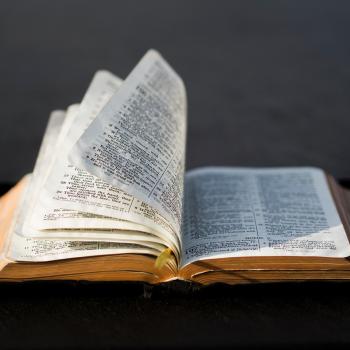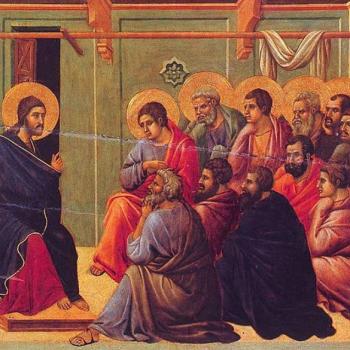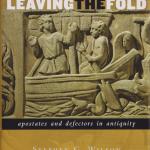The Apostles’ Creed is a confident summary of true Christian faith. But is the Apostles’ Creed still a good measure of right belief in 2023? And can I, a post-modern post-Evangelical Christian influenced heavily by science and skepticism, recite the Apostles’ Creed and mean it?

Faith without the Apostles’ Creed
As a child of American Evangelicalism I didn’t learn the Apostles’ Creed, or any other creed, as the basis for my faith. We went the biblical route instead, and learned a set of key verses from the New Testament to define Christian belief. The closest we came to a creed was during baptism, when the baptizer would ask the baptizee if they believed in God the Father, the Son, and the Holy Spirit, and if they had accepted Jesus as their Lord and Savior. The person affirmed, and into the water they went. But in all other areas of church life, creeds were for other people.
Evangelical churches have doctrinal statements, but no one reads them. We discuss and argue a wide range of beliefs on biblical grounds. But most Evangelicals are never taught or tested on doctrine, even their own. I certainly never saw anyone expelled from a church for an issue of belief.

Am I a Heretic?
Recently, however, I have personally departed from the insular spiritual environs of my childhood. On the internet, the circles I run in are of the ancient Christian mystical variety. My core beliefs have shifted to include other verses from the New Testament than the ones I learned in VBS as a kid (gasp!). I even hold to expressions of faith from my spiritual ancestors in the Christian mystical tradition, expressions like the Divine Exchange Formula (double gasp!).
So, naturally, I have been labeled a heretic by the highest council of all inquisitors – YouTube commenters. From what I can tell, Evangelicals don’t like it when I use words they don’t understand, and members of more structured traditions get upset because I belong to the wrong church.

As tempting as it is to measure my spiritual orthodoxy by the opinions of an online mob, I need a firmer standard by which to judge my own heresy. So for the next few weeks, I will be reflecting on the Apostles Creed to determine whether there is hope for my eternal soul, or if the YouTube Inquisition is correct and I am, in fact, a lost cause.
In Part 1 we’ll look at how we got the Apostles Creed, and the way it functioned in the ancient Christian community.
Discipleship and the Creeds
At the end of the book of Matthew, Jesus leaves his disciples with a command to continue his mission. We call his final orders The Great Commission:
“Go therefore and make disciples of all the nations, baptizing them in the name of the Father and of the Son and of the Holy Spirit, teaching them to observe all things that I have commanded you…” (Matthew 28:19).
The earliest church simply obeyed Jesus. They introduced people to Jesus’ life and teachings, first through the stories about him, then through the Gospels and especially the book of Matthew. When someone made a new commitment to Jesus and his Way, they baptized the person into the Christian community and that was that. It was a grassroots movement, centered around Jesus, guided by the apostles, and led by the Holy Spirit.
Within a generation or two, the early church found itself with more complex questions to answer. There are lots of different ways to respond to Jesus. New, strange ideas about Jesus and his message began to sprout across the Roman Empire. The early church struggled with questions like “How divine was Christ?” and “What does a true Christian believe?” and “How Christian do you need to be for baptism?”
These were difficult questions. Answering them took a long time, and involved a lot of political intrigue and even real violence. In the process, an authoritarian structure arose within Christianity that still haunts us today. But to set the standard, maintain order, and construct a distinctly Christian identity for believers, the early churches developed creeds.

Early Christian Creeds
Christian creeds are summaries of shared Christian belief. The first creeds grew out of baptismal formulae, or doctrinal questions that new converts answered before they were baptized. A baptismal candidate would stand before the church, and the pastor or bishop would ask:
“Do you believe in God, the Father Almighty, maker of heaven and earth?”
The baptismal candidate, lready instructed in the basics of Christian belief, answered, “I do.” There were other questions about Jesus, the Holy Spirit, the church, and salvation. If a new believer answered “I do” to every question, they were baptized and made a full member of the Christian community.
Over time, the baptismal formulae were organized into creeds that were learned and recited. The creeds were “symbols” of belief, short declarations that Christians used to show each other that they were on the same page.
The Apostles’ Creed is based on an older Roman baptismal creed, and was finalized in the 4th or 5th century. Many churches today still teach the Creed as the official summary of Christian belief. These churches use the Apostles’ Creed as the standard to measure orthodox belief and heresy. Affirm the Apostles’ Creed, and you are a Christian like us. Deny the creed, and you are something else.
The Apostles’ Creed as a Standard of True Faith
Now, I don’t believe that the Apostles Creed is the absolute measure of a person’s faith. Creeds were not a part of my upbringing and they play no real part in my spirituality today. I’m suspicious of authoritarianism in all its forms.
But we live in an age of popular opinion and feelings. People like me are labeled “heretic” for deviating slightly from the established vocabulary. Frankly I’m sick of it, and I long for a standard that I can use to measure my faith that transcends the opinions of people who watch my videos on YouTube.
I don’t know if the Apostles’ Creed is the standard I’m looking for, but since it’s a whole lot better than YouTube comments, let’s see what the Apostles’ Creed has to say about my faith.
Here ends Part 1 of this series. Click here for Part 2, where we dive into the first words of the Apostles’ Creed, “I believe.”
Meanwhile, check out my YouTube channel here, and contact me through my website to get on my email list. I’m publishing a totally orthodox, non-heretical book about following Jesus called Jesus: A Field Manual, and I would love to let you know when you can pre-order it. Thanks for reading!

















